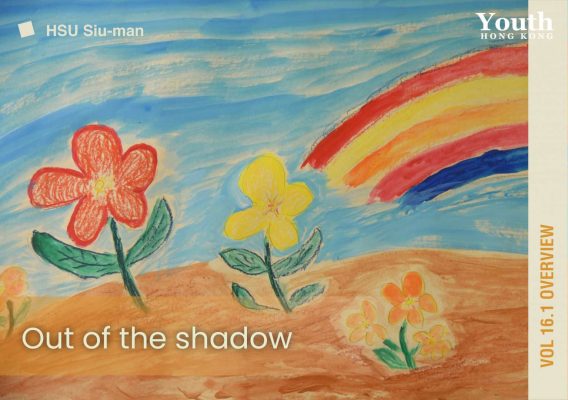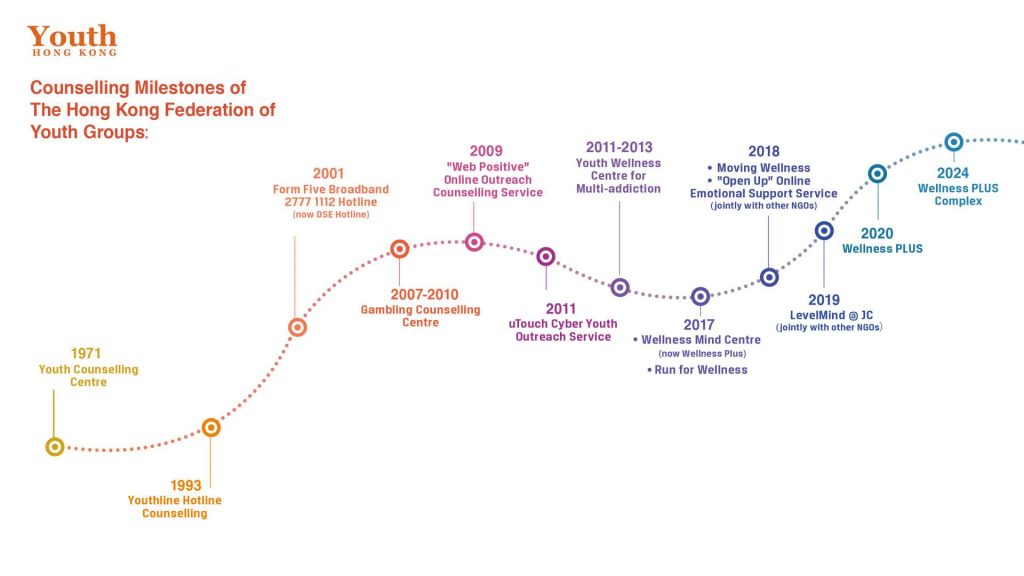//vol.16-1 Overview
Out of the Shadow
by Hsu Siu-man
The Federation, as a pioneer of youth counselling services in Hong Kong, is aware of the current mental health crisis. In the face of this pervasive challenge, it is imperative to contemplate strategies for building resilience and a robust peer support network among the younger generation.
“A haunting shadow.” 1 This is what the mental health crisis around young people has been called. A shadow cast by hopelessness, fear, anxiety and depression, caused by external circumstances and internal perceptions of self.
There are statistics galore that inform us of this growing and troubling phenomenon. Mental health does not discriminate: the age range varies from children in primary school, through adolescents, up to university students and young professionals. The demographics do not matter either: this is a global issue with no consideration of economics, ethnicity, religion, culture, language or tradition.
While these statistics are essential in the mapping of young people’s mental health, it is equally important to remember that they are really just numbers based on what respondents wish to divulge. They are figures that represent those brave enough – or anonymous enough – to admit that they are struggling with their mental health. The fact is, there are many more young people who say nothing but are anxious, and there are others who try and say something, but are either not heard or are casually dismissed.
This reality points to the complex nature of understanding young people’s mental health issues and then trying to provide suitable services. Sometimes, these young people are not able to cope with what might be called “routine” burdens, stress and pressures. One may call this the “invisible band” of young people who struggle with anxiety, worry and depression, but who do not necessarily require clinical assistance. Their first step towards help and healing may be more communal or collegial.
As an early proponent – and in many ways a pioneer in Hong Kong – of counselling services to young people, the Federation is very aware of the need to constantly and consistently reassess the methods and means of, identifying young people in trouble; reaching out to them; and providing the relevant service.
These steps have taken on greater resonance, given the increasing numbers of young people manifesting struggles with mental health, as well as the more worrying cases of suicides and displays of suicide ideation. It has been suggested that much of our current situation might be a result of the destabilising effects of the pandemic, with its educational readjustments and social isolation, as well as the relentless comparisons on social media.
So, what should be done, given the insufficient number of clinical and medical professionals and their lack of availability in moments of deepest crisis? Or that there are not enough front-line social workers with specialised mental health training. Or that we are expecting teachers to take on the added burden – on top of their very heavy workloads – to provide extra care to the students. Or that most parents feel either unable or unwilling to recognise, let alone support, their children.
What we see is a group of young people, the silent majority, who when empowered with tools and skills of resilience, may be able to better cope with daily challenges, which in most circumstances ebb and flow as they – and in fact all of us – pass through different stages of life’s transitions. With more positive reinforcement and non-stress-inducing activities, they might be able to build up self-confidence, but more importantly, self-awareness to tackle difficult situations.
Self-awareness is important because it forms the foundation upon which healthy, balanced lives can be built. Self-awareness informs us that to have moments of sadness is normal. That it is normal to go through periods of feeling “blue.” That it is also normal to worry about the future and to be anxious about the present, and that failure and disappointment are not the end of the road.
To be self-aware is also to understand that there are no perfect lives on social media and that there is a very high probability that one’s friend, peer, colleague or family member might be feeling exactly the same at any given moment. Most importantly, self-awareness is a reinforcement that stress can be managed.
Building resilience in young people is what the Federation sees as the next step in its long history of counselling and health management. Creating a wellness balance to cover all aspects of life, along with non-pharmacological intervention, can include opportunities to participate in leisure, culture, sports and other activities, while also learning how to engage in conversation and talking about feelings with others, so as not to feel alone.
The Federation advocates creating networks of peers and non-medical professionals to be able to provide initial care and assistance to those who are struggling. Educating more and more people, including youth, in mental health literacy goes a long way to break down barriers of stigma and shame. Creating peer groups provides a safety valve for those who need to talk and enables all of us to see how normal it is not to be perfectly “normal” all the time.
Yes, there are many young people who need clinical support. But there are also many others who can be helped to build up their resilience so that the “haunting shadow” is never something permanent, but transient. Like real shadows. ■
Counselling Milestones of The Hong Kong Federation of Youth Groups
| 1971: | Youth Counselling Centre |
| 1993: | Youthline hotline counselling |
| 2001: | Form Five Broadband 2777 1112 hotline (now DSE hotline) |
| 2007-10: | Gambling Counselling Centre |
| 2009: | “Web Positive” Online Outreach Counselling Service |
| 2011: | uTouch Cyber Youth Outreach Service |
| 2011-13: | Youth Wellness Centre for Multi-addiction |
| 2017: | Wellness Mind Centre (now Wellness Plus) Run for Wellness |
| 2018: | Moving Wellness “Open Up” Online Emotional Support Service (jointly with other NGOs) |
| 2019: | LevelMind @ JC (jointly with other NGOs) |
| 2020: | Wellness PLUS |
| 2024: | Wellness PLUS Complex |
1. “The silent crisis of youth mental health”, the EPP Group, European Parliament. 6 September 2023.
2. Our World in Data, mental health
World Health Organization, newsroom, fact sheets, mental disorders
World Health Organization, health topics, mental health



